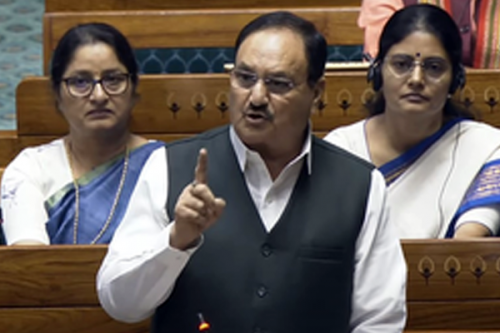164 pc increase in health budget since 2014, says J P Nadda

New Delhi, Aug 5 (IANS) Union Health Minister J.P. Nadda on Monday addressed the Lok Sabha in response to the Demands for Grants related to the Ministry of Health and Family Welfare for 2024-25 and said that the budget for health infrastructure has marked an "increased of 164 per cent" in the past decade.
Stressing that under the leadership of Prime Minister Narendra Modi, the health sector has been "prioritised" in the budget allocation, he said that several suggestions were raised in the Lok Sabha regarding the health infrastructure which were "welcomed" by the Centre.
"Most of the suggestions focused on two main points: increasing the budget for the health sector and reducing out-of-pocket expenditure. I welcome these suggestions," he added.
Highlighting the significant increase in the health sector budget over the years, Nadda said, "In 2013-14, the budget was Rs 33,278 crore, and today it stands at Rs 90,958 crore, marking an increase of 164 per cent. This demonstrates our prioritisation of the health sector."
He also mentioned that local governments have allocated an additional Rs 71,051 crore, as suggested by the 15th Finance Commission Report.
"The National Health Mission (NHM) ensures that state governments strengthen their health infrastructure and logistics, with Rs 55 crore allocated from the total health budget," Nadda added.
He mentioned that under the Pradhan Mantri Swasthya Suraksha Yojana (PMSSY), Rs 13,900 crore has been spent to strengthen tertiary health care.
Nadda also noted progress towards the target set in the 2017 health policy to spend 2.5 per cent of the GDP on health. "We have increased from 1.1 per cent to 1.9 per cent and are moving towards 2 per cent."
Addressing out-of-pocket expenditure, the Health Minister stated, "It has been reduced from 62 per cent to 41 per cent by solidifying the base of Ayushman Bharat, free drugs and diagnostic facilities, free screening, and many more. We will further reduce this under the leadership of PM Modi."
Nadda emphasised the four mission-mode projects under the National Health Policy, highlighting the Pradhan Mantri Jan Arogya Yojana (PMJAY), which provides Rs 5 lakh coverage to 12 crore families, equating to 40 per cent of India's population.
He praised the expansion of the All India Institute of Medical Sciences (AIIMS), from one AIIMS previously to 22 now, with 18 operational and two under construction.
"The number of medical colleges has also increased from 387 to 731, and undergraduate seats have risen from 51,348 to 1,12,112, with a 118 per cent increase in postgraduate seats," Nadda added.
Responding to criticisms, Nadda addressed Trinamool Congress Kalyan Banerjee's remarks, defending the health infrastructure improvements under the PMSSY.
"Senior member is so educated that he does not know what the PMSSY is," he said, responding to Banerjee, who called the Union Minister a "liar" while Nadda was speaking on health infrastructure.
Additionally, the Health Minister also discussed the increase in health centres, PSCs, and CSCs in both rural and urban areas and the establishment of Ayushman Arogya Mandirs to provide comprehensive primary health care services in remote areas.
Moreover, Nadda talked about the free medical facilities, mobile healthcare services, and the "you quote, we pay" plan for doctors, ensuring they receive competitive salaries for operating in hard-to-reach areas.

|

|

